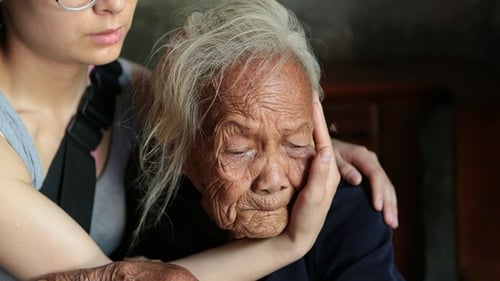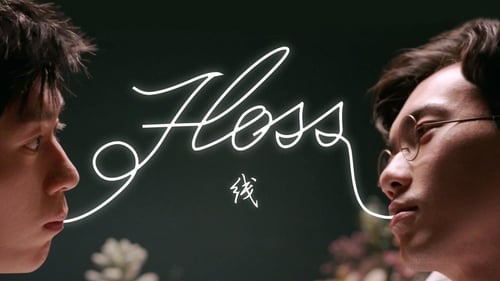Yuguo and His Mother (2011)
장르 : 다큐멘터리
상영시간 : 54분
연출 : Gu Tao
시놉시스
Yuguo, from Mongolia, lost his father when he was very young. His mother Liuxia was not able to raise him as a heavy drinker. With social support, she sent Yuguo to Wuxi for free education. Liuxia is depressed all day long, and she finds sustenance of missing Yuguo in reindeer and wine. One winter holiday after many years, Yuguo returns to his hometown, the Evenki settlement deep in the Greater Khingan mountains. At that time, he is no longer the boy who just left home, but a thirteen-year-old teenager. Facing alcoholic mother, poetic uncle, pure people from the tribe, familiar yet strange forest, Yuguo, who grew up in the city, doesn’t know what to do. In the snow-laden mountains of Aoluguya, northeast of Inner Mongolia, the film chronicles their brief time together. Yuguo and His Mother is the second documentary of Gu Tao’s Evenki trilogy.

Xuan is a young man working in the film industry in Beijing. To make a documentary film that he wants to present at international festivals, he decides to take advantage of the holidays of the Day of the Dead to return to Chengdu, his hometown located at the other end of the country. The documentary he is about to make is about his relationship with his own lover. He leaves for Chengdu, accompanied by another man, Bo, the cameraman of the film. The two men take the train to Chengdu where Hong, Xuan's lover, is waiting for them. From the first moment of their arrival at the station, Xuan and Bo begin to turn with their camera, Xuan having already explained to Bo what he wanted to film and that Hong would always be "playing", Bo then trusting in Xuan. But Hong is more and more opposed to this camera and the presence of Bo.

황샤오유의 가족은 오랜기간동안 위기를 겪고 있다. 동성애자로 밝혀진 아버지와 신경질적인 어머니가 아슬아슬한 결혼생활을 유지하고 있기 때문이다. 그러나 프랑스인과 결혼 후 임신 6개월차에 접어든 황샤오유가 친정으로 돌아오며 가족의 위기가 더욱 심해지기 시작한다.

중국 지역 일본군 ‘위안부’ 피해자 20만 명 2014년 촬영 당시 생존자 단 22명 그 22명의 할머니들이 들려주는 마지막 이야기 그리고… 2018년 8월 현재 중국에 남아 있는 ‘위안부’ 피해자는 단 6명 할머니들 대부분은 90세를 넘겨 삶의 끝자락에 서 있다.

A soon-to-be first-time voter, the filmmaker’s thought-provoking journey into the Rust Belt and South captures four Asian American voters’ ardent first time grassroots political participation ignited by the 2016 rise of “Chinese Americans for Trump.” FIRST VOTE is a character driven cinema verité style film chronicling the democratic participation of four Asian American voters from 2016 through the 2018 midterm elections.

Xingxi travels alone to Alor Setar, a town in Northern Malaysia. As a consequence of a blown tire, she experiences three variant adventures. She introduces herself to people using different identities with mysterious secrets. In return, what the journey brings her is thoroughly unexpected. In the first adventure, Brooke is a traveler; in the second adventure, Brooke is an anthropologist; in the third, Brooke is a divorcée. She is a disheartened woman who comes across a French writer named Pierre. The two lonely travelers become instant friends. Their age gap enables them to have their respective insights into life and death. Meanwhile, it is not until the enigmatic side of Alor Setar begins to unfold that Brooke tells Pierre the true reason why she has come. They seek to understand the interaction between love and life. As the story comes to an end, mother nature shows her beauty with the magical Blue Tears phenomenon on prominent display.

마이키앙은 등대에서 일하는 30세 전후의 노총각이다. 외롭고 단조로운 생활속에 그는 꿈속에서 종종 첸킹이라는 여자를 만난다. 호텔에서 일하는 첸은 서른도 못되어 남편을 잃고 자신의 아들 과 함께 불운한 삶을 사는 여자다. 어느날 두사람은 만나게 되고 마이는 첸에게 자신과 관계를 맺을 것을 강요한다. 첸이 울자 마이는 심한 자책감을 느낀다. 호텔 지배인 모아저씨는 첸이 강간 당했다고 믿고 마이를 고소한다. 마이는 감옥에 갇히는데 나중에 첸이 강간이 아니라고 증언을 하여 마이는 석방된다. 첸은 세간의 입놀림의 표적이 되고, 그 사실을 알게된 마이는 첸을 찾아간다.

The relationship between two young men in Beijing becomes strained after one of them develops an unusual fetish.

A wistful but witty account of a trip to Beijing by filmmaker Viv Li, a Chinese art student who has been living abroad for ten years. Her stay with her family mercilessly exposes how uprooted she has become by her life abroad.

The Chinese Department of Sun Yat-sen University (Guangzhou) staged the Chinese debut of "The Vagina Monologues" in December 2003. Since then, this feminist play, which came from the US and has been committed to the elimination of gender-based violence, has incited a vagina hurricane that blew all over mainland China.

Xu Xin’s film “Dao Lu” (China 2012) offers an exclusive “in camera” encounter with Zheng Yan, an 83 year-old veteran of the Chinese Red Army, who calmly relates how he has navigated his country’s turbulent history over three-quarters of a century.Born to a wealthy family in a foreign concession, Yan joined the Chinese Communist Party (CCP) in 1941 because he sincerely believed in the socialist project, and in its immediate capacity to free China from the Japanese yoke and eradicate deep-rooted corruption.

철도 위에서 3년 이상 촬영하면서 빛과 어둠, 언어와 제스처가 교차하며 변화하는 중국의 내면을 담았다. 추상회화를 연상케 하는 프레임을 통해 인간과 기계의 만남을 묘사한다. 기차의 일상과 인간을 추상적 이미지로 조형한 에세이 필름. (2015년 제16회 전주국제영화제) 리뷰 3년의 시간 동안 중국의 원근각지를 이동하는 철도의 이모저모를 편집하여 만든 에세이 다큐멘터리이다. 철로, 곤히 잠자는 사람들, 콩나물시루 같은 기차의 낭하, 좁은 통로에서 담배를 피우는 사람들은 중국 사회의 빛과 그림자를 무연히 은유한다. J. P 스니아데키 감독은 추상회화를 연상케 하는 회화적인 프레임 구성을 즐겨 사용한다. 순간순간 카메라의 존재를 드러나거나 카메라 뒤에 있는 자신을 드러내기도 한다. 육중한 철의 질감, 비곗덩어리, 핏물이 흐르는 내장 등의 오브제들을 활용하면서 그는 빈 라덴이나 카다피와 모택동을 비교하는 중국 사람들의 이야기를 슬쩍 끼워 넣음으로써 사회학과 문화인류학을 오간다. 슬금슬금 옆걸음질 치며 잠행하는 카메라는 영화의 말미에 쾌적한 상 등급 고속열차로 점핑한다. 철도, 기차의 일상, 인간을 추상적인 이미지로 조형해낸 이 에세이 필름은 사물을 응시하는 밝은 눈을 지닌 예술가의 노력에 의해 탄생했다. 2014년 「필름코멘트」가 선정한 10대 영화에 이름을 올렸다. (2015년 제16회 전주국제영화제/장병원)

Hong Kong, at the height of the protests. A young woman visits her father, whom she has not seen for a while. Her plan is to have lunch with him before the Umbrella Movement reaches a critical juncture. Celebrated, committed filmmaker Ying Liang contributed with a beautiful moving short with an special angle asking: Where do we live, and what is citizenship?

In 1994, the oil-rich city of Karamay in Northwest China was the site of a horrible fire that killed nearly 300 schoolchildren. The students were performing for state officials and were told to stand by while the officials exited first. After the fire, the story was heavily censored in the Chinese state media. To this day, the families of Karamay have not been allowed to publicly mourn their children.

This short film shows a quest of two homosexual couples for understanding from the people in their surroundings, through meetings and exchanges on a square in the heart of Beijing.

A 17 year old boy from a village in the Sechuan province leaves for the big city looking for his father, who left 6 years before and has not been heard of since. The fact that his mother still receives money his father does nothing to tame his anger. He his not looking for a warm reunion, it is unconcealed revenge that drives him. Totally lost, he roams the big city with his basket of ducks on his back...

The "Great Sichuan Earthquake" took place at 14:28 on May 12, 2008. In the days after, ordinary people salvage destroyed pig farms in the mountains, collect cheap scrapped metals, or pillaging other victims' homes. Behind the media circus of official visits is an inconsolable grief of families searching for loved ones. As the Lunar New Year approaches, vagabonds and family tell of the ill-handling of rebuilding schemes and misuse relief funds. As they prepare for another visit from a high official, the refugees are swept out of the town and into tent cities. The promise to put a roof over their heads before winter seems impossible to keep.

In 1946, Heidi is entrusted to a Swiss family by her father. He will never come back for her. Today, François Yang questions his mother about her past. What follows is a journey to China, a quest to reconstruct memory. Through contact with her brothers and sister, Heidi measures the extent of the drama experienced by her family that remained in China, persecuted by the Communist Party.

The movie follows two unfortunate secret lovers who are constantly looking for a solution to their situation. Both of them are always arguing over their relationship. One day they went to a trip out of the city, into the outskirt. They hope they can solve their problems or at least escape them temporarily. They don’t have a solution, and they don’t understand why they are together. One thing that keeps them together is their love and care for each other. This is the second part of James Lee’s Love Trilogy which takes another look at unfaithfulness or rather faithlessness.

In this talk, Li Hongqi reviewed his transition from fine art to cinema, and his aesthetic and philosophical exploration from his early 'So Much Rice' to recent 'The The'. Dir. Li Hongqi also shared his strong anxiety of his existence(born with melancholia), his thought on cinema art (actually, I don't think there's any movie worth making), his epistemology, his religious view, his consideration on contemporary cinema, and what he learned about living in seclusion.

One overseas phone call, but one phrase was lost to the receiver of the call.









